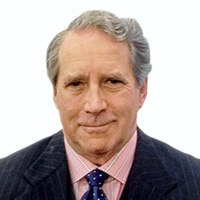A Future Headline: Biff’s Investing Firm Cleans Up With AI
A future Biff and his fictional investment company will conspire to rip you off by professing to use amazing AI tools. How can you protect yourself?


Profit and prosper with the best of Kiplinger's advice on investing, taxes, retirement, personal finance and much more. Delivered daily. Enter your email in the box and click Sign Me Up.
You are now subscribed
Your newsletter sign-up was successful
Want to add more newsletters?

Delivered daily
Kiplinger Today
Profit and prosper with the best of Kiplinger's advice on investing, taxes, retirement, personal finance and much more delivered daily. Smart money moves start here.

Sent five days a week
Kiplinger A Step Ahead
Get practical help to make better financial decisions in your everyday life, from spending to savings on top deals.

Delivered daily
Kiplinger Closing Bell
Get today's biggest financial and investing headlines delivered to your inbox every day the U.S. stock market is open.

Sent twice a week
Kiplinger Adviser Intel
Financial pros across the country share best practices and fresh tactics to preserve and grow your wealth.

Delivered weekly
Kiplinger Tax Tips
Trim your federal and state tax bills with practical tax-planning and tax-cutting strategies.

Sent twice a week
Kiplinger Retirement Tips
Your twice-a-week guide to planning and enjoying a financially secure and richly rewarding retirement

Sent bimonthly.
Kiplinger Adviser Angle
Insights for advisers, wealth managers and other financial professionals.

Sent twice a week
Kiplinger Investing Weekly
Your twice-a-week roundup of promising stocks, funds, companies and industries you should consider, ones you should avoid, and why.

Sent weekly for six weeks
Kiplinger Invest for Retirement
Your step-by-step six-part series on how to invest for retirement, from devising a successful strategy to exactly which investments to choose.
It’s only a matter of time before a story with that headline, or something like it, appears in the financial press. Recent stories in the news indicate that elite investment professionals have purportedly had astounding success in trading securities for short-term profits by using artificial intelligence (AI) programs to chart the course of investments. This may well be the future, because computers can do everything faster than human brains.
Somewhere, in his parents’ basement, the next Sam Bankman-Fried — let’s call him Biff, after the blowhard from the movie Back to the Future* — is using an AI program to determine which securities to buy and when to buy and sell them. He founded Biff’s Investment Management, and he’s making money hand over fist, not just for himself, but for his very happy clients. Until he doesn’t. It could be that Biff’s AI program wasn’t as foolproof as he thought. It could be that Biff’s finger slipped, and he shorted a lot more stock than his AI program told him to sell. It could be that a disgruntled troll in Biff’s back office just made a series of blunders.
Biff is a fraud
Or, as I hereby predict, Biff doesn’t have an AI program at all. The trades were never made. The profits never existed. The reports to his clients were a series of postdated fabrications. Does this sound familiar? It should. Just substitute “Bernie Madoff” for “Biff.”
From just $107.88 $24.99 for Kiplinger Personal Finance
Become a smarter, better informed investor. Subscribe from just $107.88 $24.99, plus get up to 4 Special Issues

Sign up for Kiplinger’s Free Newsletters
Profit and prosper with the best of expert advice on investing, taxes, retirement, personal finance and more - straight to your e-mail.
Profit and prosper with the best of expert advice - straight to your e-mail.
Madoff made his customers believe him by inventing a nonexistent trading strategy that purportedly beat the stock markets. Every. Single. Month. But he never made any investments at all. How did he fool his clients? Toward the end of every month, his staff of collaborators would pick a few stocks that had actually risen in value that month, backdated fictional purchase confirmations for trades that had never been made at the beginning of the month and equally fictional sale confirmations for the end of the month. Customers got statements showing those fictional monthly gains.
Instead of investing his clients’ money, Madoff funded a lavish lifestyle for his family and used later investor cash to pay off any customer who chose to withdraw money. It was the biggest Ponzi scheme in history.
Biff will tell his clients that his AI program has been tested by millions of hypothetical trading scenarios and is 97% profitable. (A 100% success would sound too much like an election result in a dictatorship.) And of course, Biff can’t share the details of how the program works this magic, because everyone would use it and would break the concept. In other words, he will simply modernize Madoff’s cover story.
What can you do to minimize risk?
AI investment advice is a new application of a very new technology, with all the risks that entails. You should not put all your financial eggs in this basket. If you do believe that there is merit to the concept that an AI program may in fact beat the market, how can you minimize the possibility that a bad actor like Biff misappropriates your cash and securities?
- As we all know from reading our collection of Spider-Man stories, Uncle Ben told Peter Parker that “with great power comes great responsibility.”** The Biffs of the world will never get that message. It falls to you to take as many precautions as you can to avoid the possibility that your assets are misused. Regardless of where you get your investment advice, make sure that your cash and securities are in the custody of a broker-dealer registered as such with the SEC and is a member of the Securities Investor Protection Corp. (SIPC). Your periodic statements from a registered broker-dealer will reflect exactly what cash and securities positions are being held for your account. Monitor those periodic statements closely. In a world where monthly statements or quarterly statements are distributed electronically, rather than mailed, it is easy to ignore them. Further, this is not a foolproof system: Madoff deceived both regulators and investors for decades. While his investors did not receive the fictional profits they thought they had earned, Madoff’s victims did receive the net amount they deposited with him.
- Identify any disparities in your brokerage firm statements from what you understand your holdings to be. Do this in writing. Remember this: Phone calls are worth the paper they are written on. If you do speak about your account with anyone, confirm the details of that conversation in writing. With email at your fingertips, there is no excuse for not having a written record of any issues.
- If you have difficulty reaching any investment professional, contact the SEC and your state’s securities commissioner immediately.
* Biff figured most prominently in the 1989 movie Back to the Future Part II, in which he used a sports almanac from the future to place bets on upcoming games.
** In particular, Marvel’s Amazing Fantasy #15, August, 1962.
Related Content
- Beyond the Hype: A Guide to Investing in AI
- Can Stocks Picked by Artificial Intelligence Beat the Market? 3 Stocks to Watch
- How AI Can Help Take the Emotion Out of Investor Decisions
- AI Has Powerful Potential to Make Investing Decisions Easier
- Don’t Hand Your Retirement Income Planning Over to AI Just Yet
Profit and prosper with the best of Kiplinger's advice on investing, taxes, retirement, personal finance and much more. Delivered daily. Enter your email in the box and click Sign Me Up.

Stephen Harbeck served as President and Chief Executive Officer of the Securities Investors Protection Corp., a nonprofit created by Congress to protect customers of failed brokerage firms, from 2003 to 2018. He guided SIPC through the insolvency of Lehman Brothers, the largest bankruptcy in history, the collapse of Bernard Madoff’s brokerage firm, the largest Ponzi Scheme in history, and other major insolvencies. Harbeck retired as President and CEO of SIPC in 2019. Since then, he has acted as a consultant to the Shanghai Financial Court, and Shanghai Jiao Tong University, and is currently a consultant to the Japan Investor Protection Fund.
-
 When Estate Plans Don't Include Tax Plans, All Bets Are Off
When Estate Plans Don't Include Tax Plans, All Bets Are OffEstate plans aren't as effective as they can be if tax plans are considered separately. Here's what you stand to gain when the two strategies are aligned.
-
 Relying on Real Estate in Retirement? Avoid These 3 Mistakes
Relying on Real Estate in Retirement? Avoid These 3 MistakesThe keys to successful real estate planning for retirees: Stop thinking of property income as a reliable paycheck, start planning for tax consequences and structure your assets early to maintain flexibility.
-
 These Small Money Habits Really Can Plant Roots
These Small Money Habits Really Can Plant RootsFebruary gets a bad rap for being the month when resolutions fade — in fact, it's the perfect time to reset and focus on small changes that actually pay off.
-
 When Estate Plans Don't Include Tax Plans, All Bets Are Off: 2 Financial Advisers Explain Why
When Estate Plans Don't Include Tax Plans, All Bets Are Off: 2 Financial Advisers Explain WhyEstate plans aren't as effective as they can be if tax plans are considered separately. Here's what you stand to gain when the two strategies are aligned.
-
 Counting on Real Estate to Fund Your Retirement? Avoid These 3 Costly Mistakes
Counting on Real Estate to Fund Your Retirement? Avoid These 3 Costly MistakesThe keys to successful real estate planning for retirees: Stop thinking of property income as a reliable paycheck, start planning for tax consequences and structure your assets early to maintain flexibility.
-
 I'm a Financial Planner: These Small Money Habits Stick (and Now Is the Perfect Time to Adopt Them)
I'm a Financial Planner: These Small Money Habits Stick (and Now Is the Perfect Time to Adopt Them)February gets a bad rap for being the month when resolutions fade — in fact, it's the perfect time to reset and focus on small changes that actually pay off.
-
 Social Security Break-Even Math Is Helpful, But Don't Let It Dictate When You'll File
Social Security Break-Even Math Is Helpful, But Don't Let It Dictate When You'll FileYour Social Security break-even age tells you how long you'd need to live for delaying to pay off, but shouldn't be the sole basis for deciding when to claim.
-
 I'm an Opportunity Zone Pro: This Is How to Deliver Roth-Like Tax-Free Growth (Without Contribution Limits)
I'm an Opportunity Zone Pro: This Is How to Deliver Roth-Like Tax-Free Growth (Without Contribution Limits)Investors who combine Roth IRAs, the gold standard of tax-free savings, with qualified opportunity funds could enjoy decades of tax-free growth.
-
 One of the Most Powerful Wealth-Building Moves a Woman Can Make: A Midcareer Pivot
One of the Most Powerful Wealth-Building Moves a Woman Can Make: A Midcareer PivotIf it feels like you can't sustain what you're doing for the next 20 years, it's time for an honest look at what's draining you and what energizes you.
-
 I'm a Wealth Adviser Obsessed With Mahjong: Here Are 8 Ways It Can Teach Us How to Manage Our Money
I'm a Wealth Adviser Obsessed With Mahjong: Here Are 8 Ways It Can Teach Us How to Manage Our MoneyThis increasingly popular Chinese game can teach us not only how to help manage our money but also how important it is to connect with other people.
-
 Looking for a Financial Book That Won't Put Your Young Adult to Sleep? This One Makes 'Cents'
Looking for a Financial Book That Won't Put Your Young Adult to Sleep? This One Makes 'Cents'"Wealth Your Way" by Cosmo DeStefano offers a highly accessible guide for young adults and their parents on building wealth through simple, consistent habits.